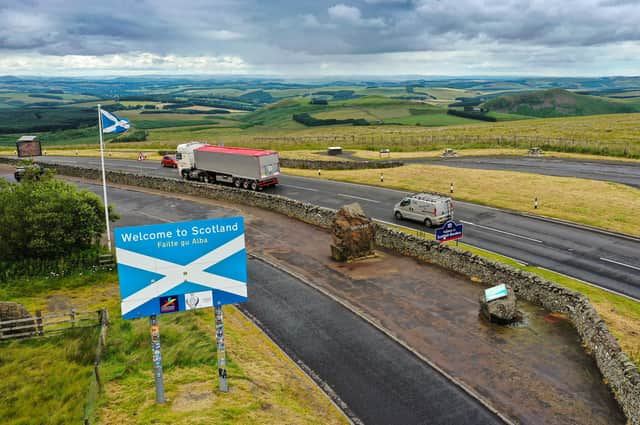Holyrood and Westminster urged to end constitutional Brexit trade row


The country's leading business organisations have called for "co-operation and compromise" from political leaders north and south of the Border to deliver "frictionless and barrier free" trade when Brexit comes into effect in just two-and-a-half months.
The Scottish Government fears the UK Internal Market Bill is a "power grab" on Holyrood powers and will mean that Westminster can legislate in areas which traditionally fall within the remit of the Scottish Parliament such as agricultural and environmental standards.
Advertisement
Hide AdAdvertisement
Hide Ad

It will also allow Westminster to spend directly in areas such as roads infrastructure and university research, which is under control of Holyrood as part of the devolution arrangement.
But the UK Government insists that arrangements must be put in place to ensure that goods can continue to be traded freely across the UK, replacing the provisions of the EU single market when the Brexit transition period expires at the start of next year.
The Scottish Government has recently hinted at a legal challenge to the Bill.
Now leading business organisations north of the Border are calling on both governments to work together and defuse tensions on the issue.


Dr Liz Cameron, chief executive of the Scottish Chambers of Commerce said: “The United Kingdom is a critical market for Scottish businesses. Trade between UK nations should remain frictionless and barrier-free.
“Whilst we welcome an approach to establish common standards to make it easier to sell goods freely throughout the UK, it is not clear as to how this will interact with devolved policies and legislation, and whether exceptions will be included within the legislation to recognise specific policies passed by the Scottish Parliament or other devolved administrations.
"We believe it is important to recognise and make provisions for devolved policy approaches which may be justifiably introduced and applied in a devolved setting for example health or environmental policies. The business community needs the UK and Scottish governments to get round the table, come up with solutions and reach a resolution.”
Scotland's trade with the rest of the UK is worth more than £50 billion a year - about three times as that with the EU.
Advertisement
Hide AdAdvertisement
Hide AdWith the economy having shrunk by a fifth at the height of the Covid pandemic and fresh shutdowns being imposed, industry chiefs say constitutional wrangling must not further jeopardise an already fragile economy.
CBI Scotland director Tracy Black said: “Right now firms across the UK are working hard to secure our economic recovery.
“The proposals to codify the UK internal market will give businesses up and down the country confidence they can continue trading across Scotland, England, Wales and Northern Ireland once the EU transition period ends.
“There’s still work to be done on important details around mutual recognition and non-discrimination rules – and business is keen to work with governments across the UK to guard against any unnecessary barriers to trade.
“The CBI encourages political leaders in Westminster and Holyrood to work together, with business, to break this impasse, so every corner of the UK can get on with delivering our economic recovery.”
There is little sign of tensions easing.
The Scottish Parliament recently voted to withhold legislative consent for the Internal Market Bill, although this is largely symbolic and Westminster can impose the legislation regardless. But there are real concerns among MSPs that Westminster is encroaching on the powers of devolution in an unprecedented manner.
Malcolm Cannon, national director for IoD Scotland, said: “The North/South divide has become more noticeable than ever this year, with several matters highlighting the disparity between the national and devolved governments.
"As this divide broadens with the disagreement surrounding the UK Internal Markets Bill, this will not only hurt cross-border relationships, but could have a detrimental effect on those who live and work north of the Border.
Advertisement
Hide AdAdvertisement
Hide Ad“Maintaining the same level playing field that is currently enjoyed by businesses is vital, irrespective of where they are based in the UK – be it Gloucester or Glasgow.
"For businesses that have bases both north and south of the Border, the Bill creates even murkier waters, meaning that some tough decisions may need to be made as to the viability of continuing operations.
"This would not only potentially create more job losses, but might impact pricing strategies and supply chains. It is imperative that continuity is secured across the UK to provide the economic stability that directors are crying out for.”
The Scottish Government has suggested there is no need for any legislation to bring about a UK internal market, as this would happen anyway under the existing provisions.
Ewan MacDonald-Russell, Scottish Retail Consortium head of policy, said an approach based on "common frameworks" between the UK and devolved governments would be preferable.
But he said: "Legal powers will be necessary to ensure open market access just as they are currently in the EU single market. Ultimately the priority for retailers is maintaining the open and largely unfettered market across the UK, which delivers for businesses and crucially consumers.”
There are already long-standing regulatory differences between Scotland and England which have yet to result in any significant barriers to trade.
Andrew McRae, Scotland policy chair of the Federation of Small Businesses, said 40 per cent of its members trade across the UK and would like to see "common standards" developed in areas where these no longer apply.
Advertisement
Hide AdAdvertisement
Hide Ad"If done properly, this would give us a more certain, stable regulatory environment," he said.
“The four UK nations must jointly develop and agree how the internal market will work. That means they all need to be committed to co-operation and compromise."
A message from the Editor:
Thank you for reading this story on our website. While I have your attention, I also have an important request to make of you.
The dramatic events of 2020 are having a major impact on many of our advertisers - and consequently the revenue we receive. We are now more reliant than ever on you taking out a digital subscription to support our journalism.
Subscribe to scotsman.com and enjoy unlimited access to Scottish news and information online and on our app. Visit https://www.scotsman.com/subscriptions now to sign up.
By supporting us, we are able to support you in providing trusted, fact-checked content for this website.
Joy Yates
Editorial Director
Comments
Want to join the conversation? Please or to comment on this article.